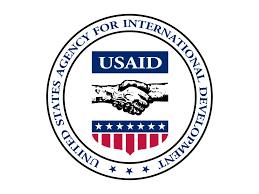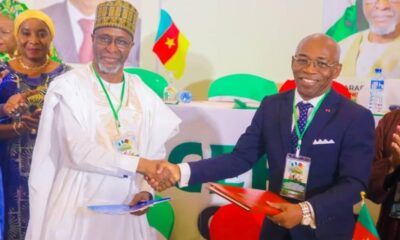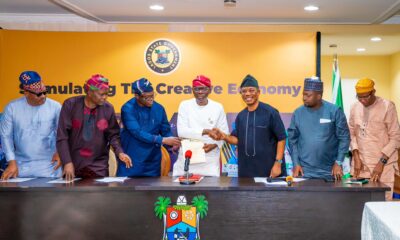News
China visits Nigeria with three ships, strengthens bilateral relationship
The Chinese Navy Escort Task Group (ETG) 162, comprising MSL Destroyer NANNING, MSL Frigate SANYA, and Supply Ship WEISHANHU, on Sunday visited Nigeria to strengthen bilateral relationship between the two countries.
The Chinese Ambassador to Nigeria, Mr Chi Jian Chun, said that the visitation of the Chinese envoy, scheduled for July 2 to 6, would also enhance maritime security within West Africa.
MSL Destroyer NANNING, made the port call at Nigerian Port Authority (NPA) Berth 21, while the other two ships remained at anchorage.
Chun said that the delegation from China was big with more than 700 people and three ships to Nigeria.
“The visit is to further deepen the relationship the two countries have with one another and also seek to strengthen and improve our relationship and cooperation with each other.
“This visit demonstrates the harmony and symphony between Nigeria and China,” he said.
The ambassador said that China and Nigeria would continue to work together and promote peace and harmony while also seeking ways to make contributions to the international community.
“I believe that this visit will deepen the cooperation between both countries military sector so that we can work together to overcome obstacles.
“We will continue to do more things to facilitate and promote the relationship between the two countries,” Chun said.
Also, the Flag Officer Commanding (FOC) Western Naval Command, Rear Adm. Joseph Akpan, said the visitation would further help to cement the relationship between the two countries.
This is “especially between the Nigerian Navy and the Chinese Navy as well as the military. This will help us fight crimes, especially in the Gulf of Guinea.
“During their period of stay, our men will be interacting, we will be having some sporting activities, exchange of momentous and gifts.
“We will also discuss the future of both navies, especially on how we can benefit from each other,” Akpan said.
The FOC added that the term called ‘sea riders’ enabled some of the Nigerian Navy personnel onboard the Chinese ship and they could also have some of their own men onboard our ship.
“This helps to foster friendship across the horizon,” Akpan said.
Chinese people resident in Lagos came out in their numbers to welcome the Chinese envoy at the NPA.
There was also a rich display of the culture of the Chinese people which could be seen in the colourful display of their synchronised dance routine at the port
News
Nigeria’s economy to experience significant growth soon – Shettima
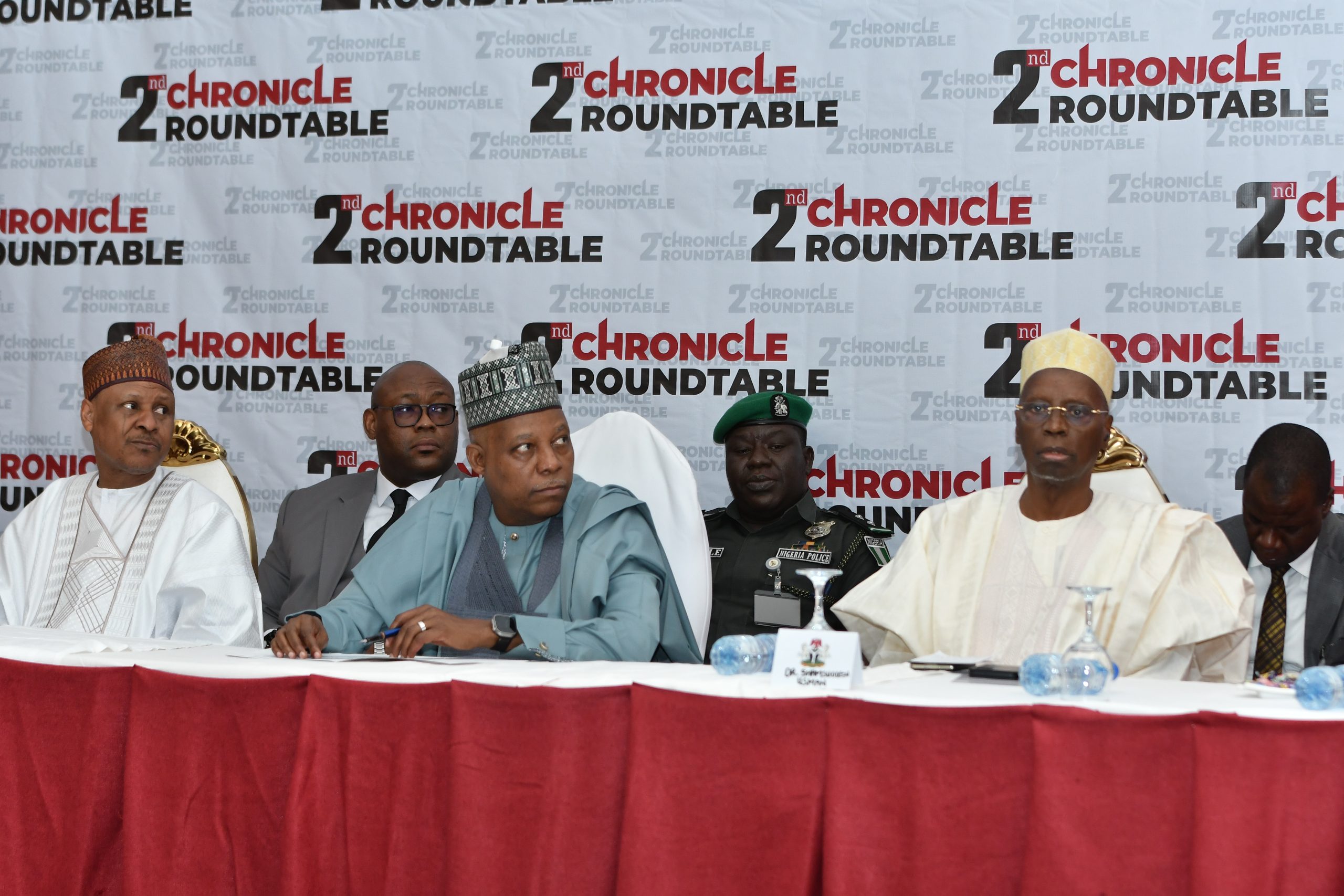

Vice President Kashim Shettima has expressed the optimism that the Nigerian economy would experience significant growth soon.
Shettima stated this on Thursday in Abuja at the 2nd Chronicle Roundtable, organised by 21st Century Media Services, publishers of 21st Century Chronicle.
The event was as part of group’s public service enlightenment series.
The Vice President implored Nigerians to be patient with the administration of President Bola Tinubu as he steers the ship of state through the economic turbulence and storm he met on ground on assumption of office.
” Soon, Nigeria’s economy will experience significant growth once we’ve overcome these sacrifices.
” Positive changes will soon be evident across all economic indicators – inflation, per capital income, Gross Domestic Product (GDP), poverty reduction, food security -, and all aspects close to the hearts of our people,” he said.
Shettima, who was the Guest Speaker at the roundtable explained some key policy decisions taken by the Tinubu administration as well as its economic and social agenda, including the removal of subsidy on petroleum products.
He described the removal of fuel subsidy as the ‘biggest elephant in the room’ before Tinubu took charge.
“We met on ground, especially the nation’s ailing economy which was already tottering towards an eclipse.
“We look forward to the positive impact on the economy that will be brought by some of our new initiatives in some sectors including, oil and gas, creative arts, steel and solid minerals, housing, blue economy, and digital.
” There is no doubt that there’s a time to plant and a time to reap.
“In between those times, we appeal for patience and seek collective sacrifice from all, especially from us.
“We wish there were a way to treat this ailment without surgery,” he said
The Vice President noted that the decision to remove fuel subsidy was quite tough considering its negative impacts on the lives of the citizens.
He said the removal, however, became an inevitable option when it was discovered that the immediate past administration of former President Muhammadu Buhari did not make provision for it in the 2023 budget.
Shettima said that Tinubu chose the option that would save the life of the nation, instead of one that would merely prolong its imminent and predicted economic death.
“We understood why our predecessor made the decision not to budget for fuel subsidy in their final fiscal year, because Nigeria’s debt service-to-revenue ratio had grown to 111.8 per cent.
” The anticipated debt crisis may sound like fancy economic jargon to the man on the street.
“However, you and I are in a better position to understand how such miscalculations have played out in other countries. It’s an economic death sentence,” he said.
Shettima added: “In plain terms, our debt servicing was such that if you earned, say, N100,000, the entirety of the money wasn’t only paid to your debtor; you were forced to borrow an additional N11,800 to pay the debtor.
“How do you intend to survive this, and how many more loans before you become a pariah?
“We are not even discussing the nation’s budget deficits, diversions of resources from critical sectors of the economy, and corruption masterminded in the subsidy regime”.
The Vice President noted that, whoever had succeeded the previous government, would have either chosen to steer the ship through the storm as Tinubu is doing or jumped ship and let the country implode.
He said those who contested the presidency with Tinubu were not morally justified to question the decision to remove fuel subsidy because it was part of the solutions they also tabled before Nigerians.
“This was because, whether in handling the subsidy matter or the forex crisis, they had also promised the solutions we had adopted.
“Those who attempted to eat their words were instantly proven wrong by data, history, and their antecedents—those emotionless reality checkers,” he said.
Shettima said, for long, Nigeria had endured economic sabotage, leading to the resolve by the CBN Governor, Yemi Cardoso, and the National Security Adviser, Nuhu Ribadu, to neutralise the overpowering influence of currency manipulators.
The manipulators, according to the Vice President, had conspired to frustrate government reforms.
” Today, I stand proud to say that their interventions have translated into desired results, and Naira’s pushback against all odds is an inspiring journey that doesn’t have to be learned in Buenos Aires, as some would want us to do,” he said
Earlier, the Chairman, Ministry of Finance Incorporated and former Finance Minister, Dr Shamsudeen Usman, praised the content of the Renewed Hope Agenda of the Tinubu administration.
He described it as one of the most detailed and carefully crafted policy document in the history of the country.
He stressed the need for the Renewed Hope Agenda document to be reviewed and integrated into the medium and long-term development framework of the country.
Usman noted that policy consistency with a long-term vision to transform critical sectors of the economy, was the way to go.
He commended the administration’s establishment of a central coordination delivery unit to track the performance of programmes, policies and key interventions of the Federal Government.
He insisted that the monitoring of key performance indicators in the policy document was critical to the success of the government.
Malam Mahmud Jega, the Chief Executive Officer of 21st Century Chronicle Media Services, said the media has the responsibility to critically analyse government policies and programmes.
Doing so, according to him, would translate to contributing in shaping the nation’s development trajectory.
News
Nigerian Customs Service inaugurates advance ruling system to improve trade


The Nigeria Customs Service (NCS) on Thursday inaugurated its Advance Ruling System to enhance trade facilitation, in Abuja.
It has also organised stakeholders` engagement to foster mutual understanding of its programmes and to facilitate the rollout of the system.
Speaking at the event, the Comptroller General (C-G) of NCS, Adewale Adeniyi, said that the move was aimed at creating a more transparent and predictable business environment for its stakeholders.
Adeniyi described advanced ruling as a critical mechanism that allowed traders obtain binding decisions from customs administrations on the classification, origin, and valuation of goods before importation.
“This tool is essential for promoting trade facilitation, reducing compliance costs, and fostering a conducive business environment, “he said.
The News Agency of Nigeria (NAN) reports the joint sponsorship by the Global Alliance for Trade Facilitation and the European Union-World Customs Organisations (EU-WCO) Rules of Origin (RoO) Africa Programme for NCS personnel training in January, on advance ruling skills for rules of origin.
NAN also reports that both the World Customs Organisation and the World Trade Organisation have emphasised the significance of advance ruling in facilitating international trade and promoting customs compliance by aiding traders in making informed business decisions.
The C-G described the launch of the system as timely, aligning with the policy directive of President Bola Tinubu’s administration to facilitate ease of trade for legitimate traders.
“This is reflected in the Policy Advisory Document of the government, which highlights recent achievements, such as the approval to decongest the ports and make them free and accessible for importers and operators.
“Additionally, the recent inauguration of the Single Window steering committee by the President underscores high-level commitment to enhancing trade facilitation in Nigeria, “ he said.
He added that the implementation was also timely, particularly considering the significant number of disputes the service had to handle between 2020 and 2023.
According to him, out of the 34 disputes, 31 have been resolved, while three cases are still pending.
“Additionally, in spite of the absence of a structured mechanism, a total of 296 requests for Tariff opinions were received, with 266 processed and 30 pending.
“It is crucial to note that the absence of this mechanism has implications beyond Trade Facilitation, as it also impacts our revenue, “he said.
He said that the service would organise workshops and sensitisation sessions at its Area Commands to ensure the successful implementation and to ensure stakeholders` understanding for effective use.
The C-G said he had given approval for the development of a handbook to provide guidance to traders and customs officers, and also to ensure consistency and transparency in the service`s rulings.
He thanked the German International Cooperation Agency (GIZ) for supporting its commitment to facilitate ease of trade.
Earlier in his remarks, the Country Director of GIZ, Dr Markus Wagner, said that the advance ruling system was part of the Nigeria Energy Support Programme, funded by the German Federal Ministry for Economic Cooperation and Development.
Represented by Duke Benjamin, the Cluster Coordinator for GIZ Nigeria Programmes on Just Transition and Inclusion, he said the knowledge provided by the advance ruling would facilitate improvement in investments in Nigeria.
He added this was due to the clarity it brought on trade processes.
News
Ajaokuta: Nigeria imports $8bn steel yearly — Minister
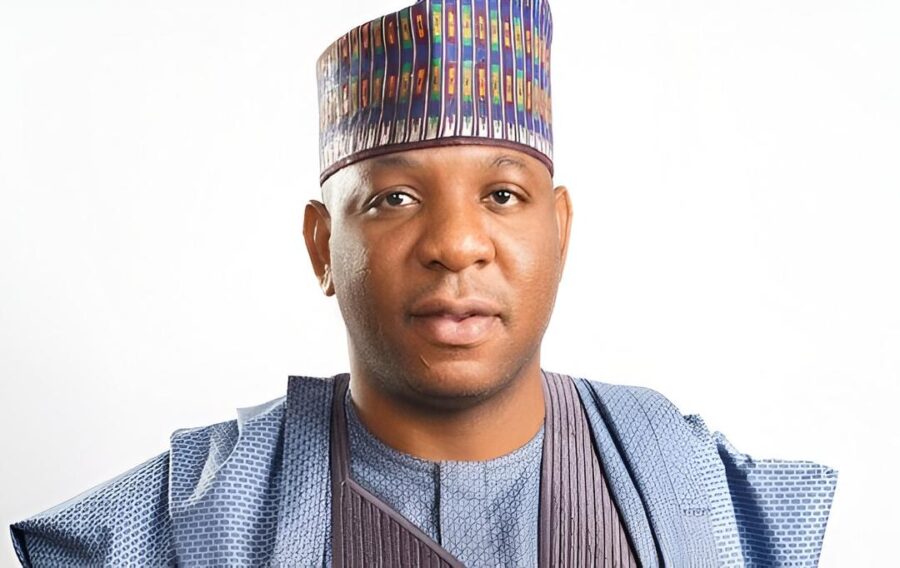

The Minister of Steel Development, Mr Shuaib Abubakar, says Nigeria spends $8 billion to import steel into the country annually, saying it has become necessary for the Ajaokuta steel company to work.
The minister disclosed this during an interactive session with the House of Representatives Committee on Steel Development in Abuja on Thursday.
According to him, the revival of Ajaokuta steel will cost money, and we have written a 10-year document for the revival. We will present the document to Mr President.
Abubakar said that it was in his own interest for Ajaokuta Steel to work, adding that he was from Kogi State and must push for such interest.
He said that the Federal Government paid $500 million dollars to terminate the concessional agreement with Ajaokuta, adding that the ministry was working very hard to find a solution for Ajaokuta Steel.
“It is a problem that has persisted for 45 years. We have gone to China to come and invest in the steel company, including setting up a new plant, and we have gone to seek financing.
He said that the challenges had changed as new technology had come up, and with innovation and discussion around it, but it had not been finalized.
“Funding is a big challenge to the ministry of steel development. The steel industry will be the bedrock of industrialization if we have proper funding.
“I am still at a stage where I need to find a solution for the Ajaokuta steel company.
On the $2 billion being requested to receive the Moribund steel company, the minister said it was just a preliminary calculation, adding that the figure might not be up to that.
According to him, this is an estimate that may not be accurate at the last decimal point. It is just a process that will allow us to arrive at the right destination.
“The president has asked me to find a solution to Ajaokuta, so the figure will change pending the outcome of the technical audit.
“It’s clear to Nigeria that for this to happen, we need funding and all the help we can get from the two chambers; this is why we need it. I need all your support to make this a reality.”
Rep. Zainab Gimba, the Chairman of the House Committee on Steel Development, urged the ministry to provide it with all the procurement processes and other responses demanded by the committee.
The committee said that Ajaokuta had remained a nightmare to many, adding that now that the minister had accepted to supervise it, Nigeria expected more from him.
-
capital market2 years ago
Rt.briscoe, FBNH, Others halts negative performance of stock market
-
Finance3 months ago
Court orders Sen. Victor Umeh to repay N136m bank debt to AMCON
-



 Abuja Update2 months ago
Abuja Update2 months agoUNDP, FG partnership needed to achieve inclusion, equity- Minister
-
Abuja Update1 month ago
Banks drive stock market performance with N147bn gain
-



 Business1 week ago
Business1 week agoTingo Group unveils Tingo Electric, Tingo Cola drink at Lagos launch
-



 Health2 weeks ago
Health2 weeks agoCapacity training will reduce migration of health workers- NPHCDA
-
News4 months ago
Oil thieves sponsoring malicious media campaign against Navy – Spokesman
-



 Infotech1 month ago
Infotech1 month agoWorld Backup Day: NITDA urges Nigerians to ensure backup of data





